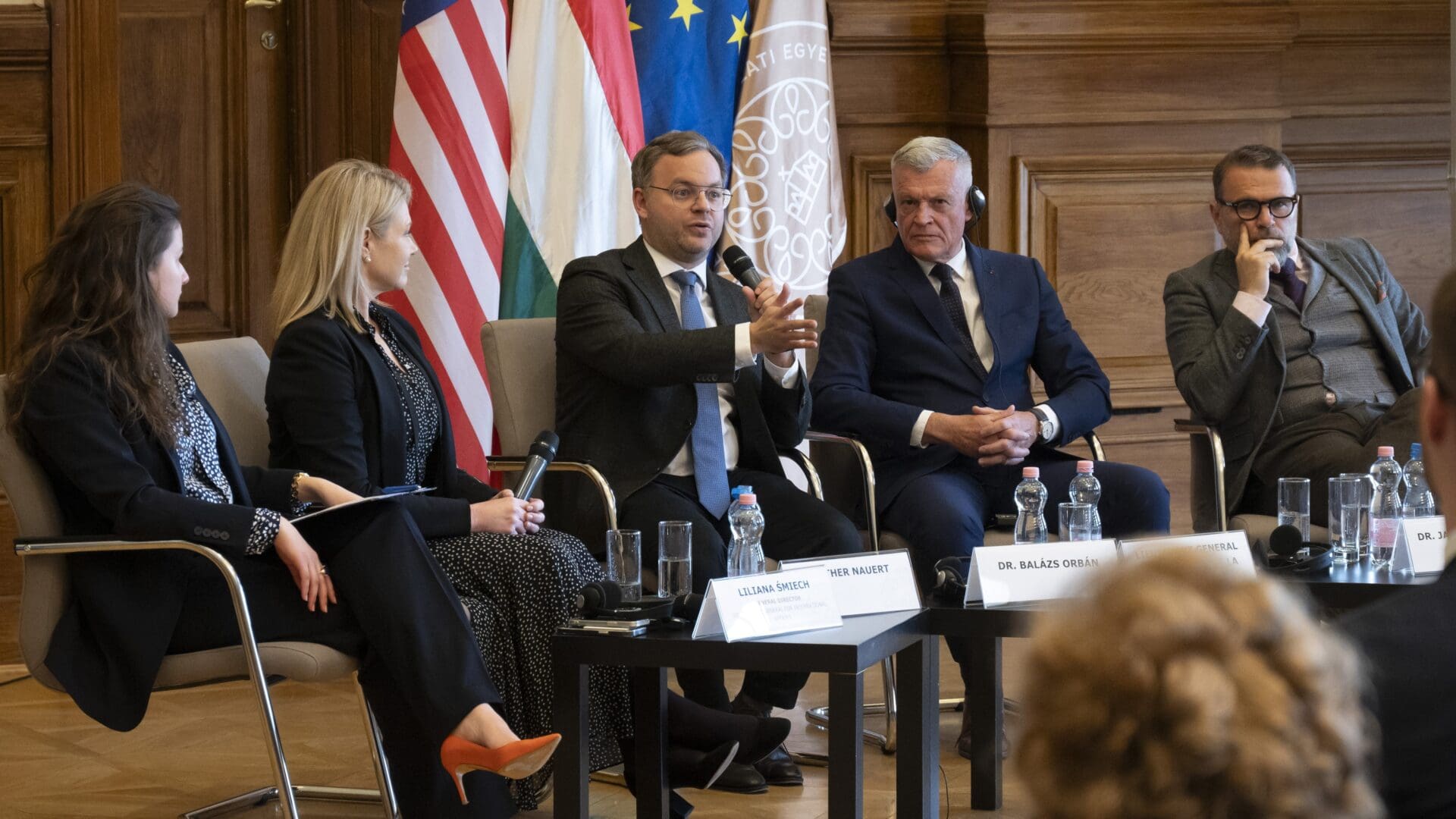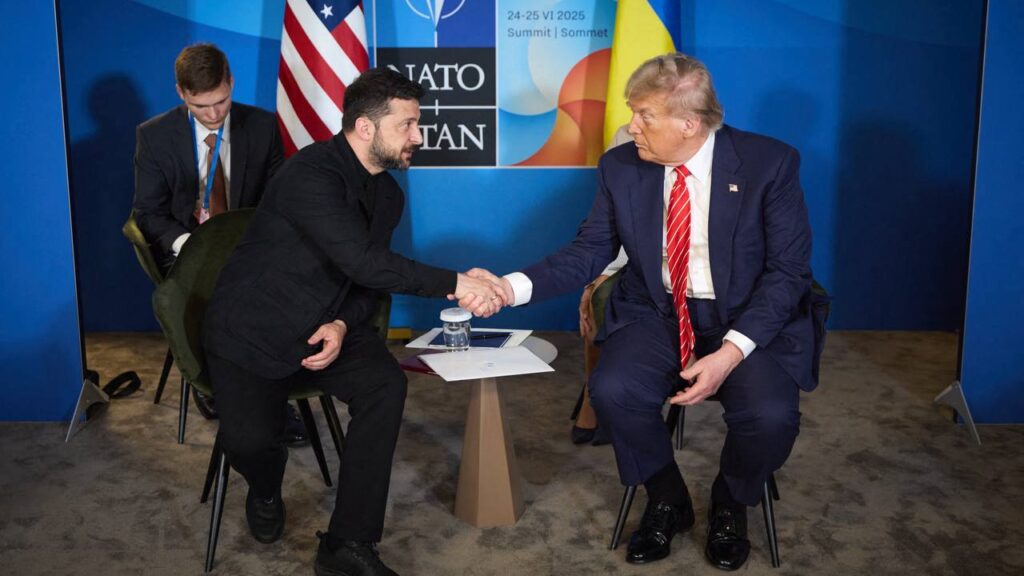On Monday, 22 April a conference was held at the National University of Public Service, focusing on the evolving global order and necessary adjustments.
First Panel – US And Europe
Experts at the first panel included James Jay Carafano, Senior Counsellor to the President and E.W. Richardson Fellow at the Heritage Foundation; Kacper Kita, analyst and columnist, member of the editorial board of the Nowy Ład portal; Tomasz Grzywaczewski, journalist, documentary filmmaker and non-fiction writer; and Dr Tamás Magyarics, Senior Research Fellow at the American Studies Research Center at Ludovika University of Public Service. The panel was moderated by Gergely Prőhle, Programme Director of the John Lukacs Institute for Strategy and Politics.
During the discussion, attendees explored the relationship between the United States and Europe, particularly pondering the impact of the upcoming American presidential election scheduled for November this year. The discussion mostly revolved around whether there is a difference in the outlook of Europe if the Biden administration remains or if Donald Trump gets reelected.
Carafano, an insightful voice in the discussion, stressed the enduring strength of US–European bilateral relations, irrespective of the election outcome. He emphasized the paramount importance of a robust NATO, highlighting its significance to American interests regardless of who occupies the White House. However, he acknowledged the existence of differing visions for America, with Biden’s approach garnering praise for its alignment with European capitals like Brussels, Berlin, and Paris, while Republicans expressed a preference for working with like-minded nations.
Magyarics echoed Carafano’s sentiment, affirming that American interests persist despite political transitions. He noted potential ideological shifts under a Biden presidency, contrasting them with Trump’s focus on bilateral connections with countries. Concerns over a Trump presidency, particularly related to trade protections, resonated within European circles.
The conversation turned to Europe’s role in security affairs, with the Polish perspective adding depth to the dialogue. There was consensus on the need for greater European commitment to military efforts, emphasizing the importance of specific countries taking responsibility rather than relying solely on the union as a military alliance. Despite differing approaches between administrations, there was shared advocacy for advancing EU military development as a means to enhance regional security.
The discussion then delved into the complexities of defence spending, with participants exploring the multifaceted nature of the two per cent defence minimum. While Carafano underscored its political and military significance, others emphasized the need for strategic investments beyond hardware. Grzywaczewski highlighted the long-term nature of military development and stressed the importance of clear goals in justifying military spending. Kita advocated for a shift in public attitudes towards military engagement, emphasizing the importance of civic education and dialogue.
Participants also deliberated on
Europe’s evolving global role amidst intensifying geopolitical competition.
Insights ranged from the impact of US–China dynamics on Europe’s economic landscape to the need for strategic partnerships with emerging global players like India. There was consensus on the necessity of sensible cooperation with non-Western countries and the importance of balancing European interests with global ambitions.
As Europe navigates the complexities of a new world order, the dialogue underscored the imperative of strategic foresight, cooperation, and adaptability in safeguarding European interests and enhancing global stability.
Second Panel – Energy Security
The second panel’s speakers included Máté Litkei, Senior Advisor at the Climate Policy Institute of Mathias Corvinus Collegium; Dr Tamás Pálvölgyi, Vice-Dean for Strategy and International Affairs at the Faculty of Water Sciences of Ludovika University of Public Service; Bryan E Leib, CEO and founder of Henry Public Relations and Senior Fellow at the Center for Fundamental Rights; and Csaba Gondola, Executive Director at the Institute for Energy Strategy. The discussion was moderated by Visiting Fellow at the Danube Institute Carlos Roa.
The panel addressed Europe’s energy security. Gondola emphasized the need to differentiate between energy independence and energy sovereignty. While the former is practically unattainable, the latter, ensuring adequate alternative energy sources in the long term, is achievable. Gondola highlighted geography as the primary factor when discussing energy supply, noting Hungary’s disadvantaged position surrounded by land from all sides. Consequently, Hungary has fewer opportunities for diversifying energy sources compared to countries with access to the sea. However, Hungary leads in the utilization of renewable energy sources, including solar power plants established in recent years, and there are significant prospects for geothermal energy.
Litkei stressed that energy policy cannot focus on a single goal. In addition to energy independence, attention must be paid to energy security, including availability and sustainability. These goals must be reconciled with other objectives such as maintaining living standards and preserving industries. Litkei emphasized the need for a pragmatic approach that seeks to harmonize these goals. He emphasized that
Hungary has taken significant steps in recent years to achieve energy sovereignty.
Significant developments have been made in renewable energy sources, as well as in network infrastructure. The Southern Stream gas pipeline has been completed, and the Hungarian electricity grid has been interconnected with those of neighbouring countries.
Third Panel – Geopolitics and Security
The third panel included Political Director of the Hungarian Prime Minister Dr Balázs Orbán; Heather Nauert, former US State Department spokesperson and acting Under Secretary for Public Diplomacy and Public Affairs; CEO of Strategy & Future Dr Jacek Bartosiak; and Lieutenant General of the French Army Bertrand de La Chesnais as guests. It was moderated by Director General for International Affairs at Ludovika University Liliana Śmiech.
Nauert kicked off the discussion by emphasizing the importance of enhanced security cooperation, underscoring that America cannot tackle security threats alone and must rely on partners such as NATO.
Orbán provided a nuanced perspective, representing a mid-sized EU country with a rich historical backdrop. He highlighted Hungary’s struggle for survival and sovereignty, stressing the need for peaceful coexistence amidst neighbouring military conflicts. He expressed concerns about the EU’s trajectory towards federalism and its impact on member states, citing migration as a significant security challenge. He expressed hope for a return to the stability of the Trump presidency.
Bartosiak delved into the broader structural forces driving global confrontation, highlighting the cyclical nature of major conflicts occurring every century. He underscored the role of productivity and power dynamics, particularly in the context of China’s rise and its challenge to global capitalism.
The conversation turned to the feasibility of common policies among the represented countries. Nauert, drawing from her recent experiences in Ukraine, expressed deep concern about Putin’s expansionist ambitions and stressed the necessity of a strong NATO as a result of burden-sharing efforts.
Orbán offered insights into the complexities of forging common ground, acknowledging differing mindsets and value systems among nations. He emphasized the importance of smart leadership and national sovereignty in navigating the changing world order, particularly for central European countries.
Bartosiak highlighted the need for countries like Poland to assert their interests amidst shifting power dynamics. He underscored the challenge of balancing power games within Europe and preparing for potential shifts in US foreign policy.
Bertrand de La Chesnais spoke about the importance of presenting different viewpoints and engaging in debates on various perspectives, allowing everyone to express their opinions. The question is whether the European Union should realize the Europe of nation-states or continue to develop in a federal direction. According to La Chesnais,
nation-states should be at the centre of Europe, and Europe needs strong leaders and clear goals.
As the discussion concluded, experts reiterated the imperative of strong partnerships amidst global uncertainties, emphasizing that ‘America first does not mean America alone’. The panellists all agreed on the need for continued dialogue, strategic leadership, and cooperation to address the complex security landscape and ensure a safer future for all.
Related articles:








